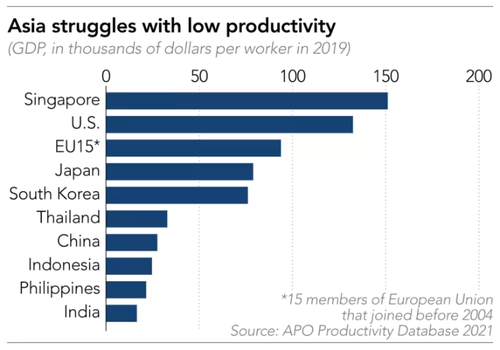The Idea Of A Four-Day Work-Week Is Spreading Throughout Asia
The idea of the 4 day workweek is starting to make its way through Asia.
The concept is being tested as long working hours are taking a noticeable toll on workers (and their productivity), a new report from Nikkei Asia says. Leading the charge is Japan, who is notorious for what Nikkei calls a “punishing” work culture.
Hitachi announced last month that it was going to implement 4 day workweeks for about 15,000 of its employees. They were soon followed by game developer Game Freak, who is the company behind the Pokemon series.
Japanese staffing giant Persol Holdings polled about 1,000 workers about what new policies they would like to see implemented. About 23.5% of respondents, the largest group, said they wanted 3 day or 4 day workweeks.
Nikkei notes that in the year leading up to March 2021, there were more than 2,800 claims for karoshi, which is literally the term for “death from overwork”. That number is up 43% from 10 years prior.
Panasonic Holdings and NEC are also considering the change and the idea is spreading across the continent.
In Indonesia, for example, lending company Alami has been on 4 day workweeks since last year. South Korean education company Eduwill has been working on the schedule since 2019 and was the first in its industry to do so.
India is also considering the idea, with the country set to implement four labor codes this year that will alter working hours and wages. The changes will offer workers the option of working four days a week.
China and South Korea also have reputations for overworking their citizens, Nikkei reported:
In China’s “996” work culture, pervasive in its tech sector, employees toil from 9 a.m. to 9 p.m., six days a week. South Koreans on average worked 1,908 hours in 2020, according to the Organization for Economic Cooperation and Development, the highest in Asia and 221 hours more than the OECD average.
Yoshie Komuro, CEO of Tokyo-based consultancy Work Life Balance commented: “Japan’s overtime is a bargain” for businesses. Governments should also push for companies to “effectively evaluate employees’ productivity,” Kumoro concluded.
Tyler Durden
Fri, 05/06/2022 – 18:00
Zero Hedge’s mission is to widen the scope of financial, economic and political information available to the professional investing public, to skeptically examine and, where necessary, attack the flaccid institution that financial journalism has become, to liberate oppressed knowledge, to provide analysis uninhibited by political constraint and to facilitate information’s unending quest for freedom. Visit https://www.zerohedge.com
